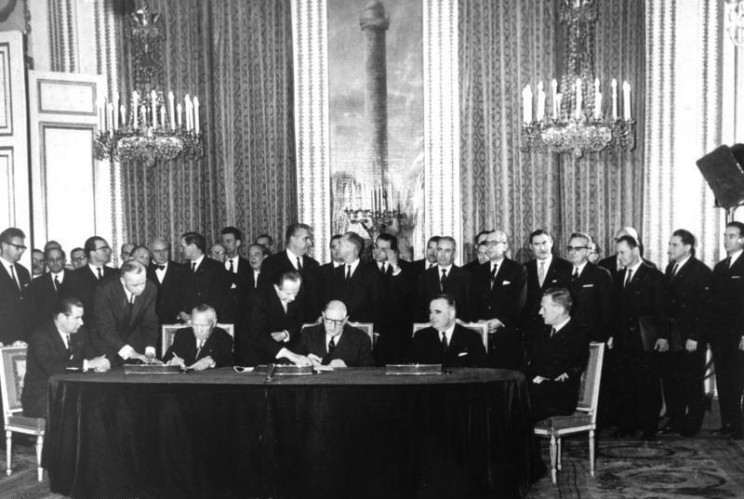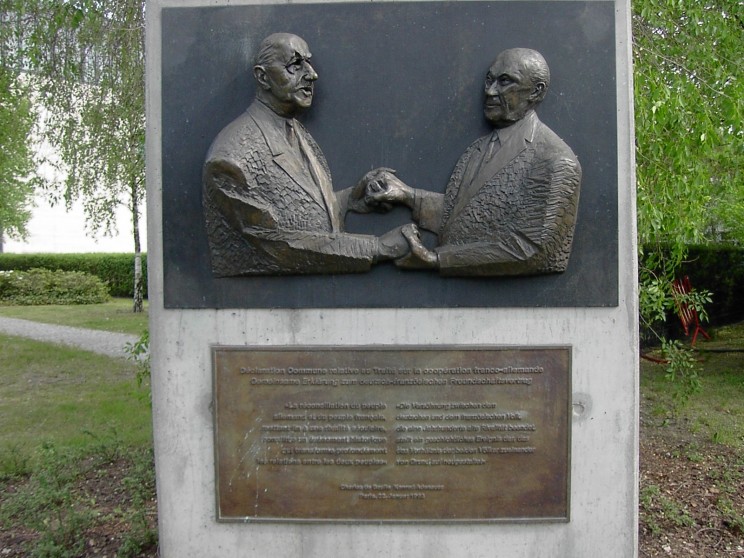Ten years ago, at the Elysée Treaty’s 40th anniversary, Alain Juppé characterized France and Germany as the “privileged guardians of the European cohesion.” As the European Union’s key countries celebrated the 50th anniversary of their bilateral Treaty, Europe traverses a whole set of crises making the Franco-German “entente élémentaire” (Willy Brandt) appear as ever more important for providing or preserving European crisis management, decision-making, and, in whatever exact form: cohesion.
The endurance and the adaptability of the bilateral Franco-German connection—in spite of frequently dramatic domestic political changes (say changes of governments, parties in power, key personnel, economic rises, social upheavals, among others), regional European transformations (including widening and deepening European integration, the fall of the Iron Curtain, German unification), and wider international rupture or dynamism (such as the collapse of the Soviet Union, the end of the Cold War, or burgeoning globalization)—is a remarkable feature of European politics of the past half-century. Different combinations of a variety of factors have nurtured both resilience and adaptability of this bilateral link over time, political domains, and specific issues:
In 1963, the Elysée Treaty crowned the period of Franco-German friendship following World War II. At the same time, the Treaty offered a frame for an emergent and lasting “special” bilateral relationship between France and Germany, and inserted the Franco-German connection at the very core of the evolving institutions and decision-making processes of the European Union and its various predecessors.

The signing of the treaty on 22nd January 1963. In the picture (sat at the table, left to right): Dr. Gerhard Schröder (Minister of Foreign Affairs), Chancellor Konrad Adenauer, President Charles de Gaulle, Prime Minister Georges Pompidou, and Maurice Couve de Murville (French Foreign Minister). Source: This image was provided to Wikimedia Commons by the German Federal Archive (Deutsches Bundesarchiv) as part of a cooperation project.
And very much in the spirit of its godfathers and signatories Charles de Gaulle and Konrad Adenauer, the Elysée Treaty helped to base this novel sort of Franco-German relationship not only on an unusual set of bilateral intergovernmental institutionalization, but also on linkages and interchange among the French and Germans beyond and below the intergovernmental level. Most notably, the past 50 years have seen the emergence and flourishing of a massive set of publicly funded or organizationally supported “parapublic” institutions and institutionalization, such as the Franco-German Youth Office (with some 8 million participants in exchange programs since its foundation); some 2200 “twinnings” (jumelages, Partnerschaften) between French and German towns or regional entities; connections between high schools and universities; and, later, the creation of the Franco-German TV channel ARTE, and the framework of the Franco-German University.
To be sure, the Franco-German connection of the past five decades has experienced numerous disagreements, crises, or even phases of protracted tensions. In retrospect, the Gaullist period, with fundamental and seemingly insurmountable divergence in French and German strategic orientations, might appear as the most trying. And yet, neither this phase, nor various enduring differences in political or economic inclinations, nor a motley crew of disagreements, have either broken the bilateral connection or led it to degenerate into marginal relevance.
At the celebrations of the Elysée Treaty’s 50th anniversary, and the beginning of what France and Germany have baptized “the Franco-German year,” two developments threaten the continued endurance and political relevance of this bilateral relationship in Europe: on the one hand, the seemingly deep disparities across major policy fields during this period of severe crises; on the other, an apparently increasing gap in economic performance and competitiveness.
As for the former, most visibly perhaps, France and Germany have so far not succeeded in developing bilateral compromises so as to decisively help manage or overcome the Eurozone crisis. Or, for that matter, even to define a coherent approach in dealing with this crisis and its possible implications for the future of European governance in the monetary realm or beyond. In the policy fields of foreign, security, and defense—equally of supreme importance—France’s and Germany’s disparate strategic cultures persist, and their visions of the EU’s role in international politics and security continue to diverge, most strikingly perhaps when it comes to the use of military force. Some of the key questions in these domains—how to position oneself and to act in an often dangerous and violent world in which the most comfortable and comforting answers do not always suffice—continue especially to plague German elites.

Plaque commemorating the restoration of relations between Germany and France, showing Adenauer and Charles de Gaulle. Photo by Adam Carr, public domain via Wikimedia Commons.
However, it is the seemingly ever worsening loss of economic performance and competitiveness on France’s side, the erosion of the domestic economic bases of France’s bilateral and European standing, and the growing bilateral asymmetry in power and influence between the two countries, that pose the greatest challenge for the future of the Franco-German connection and for the survival of the Eurozone. While it is hardly conceivable that the Franco-German relationship could be based on a France lastingly in the role of the junior partner, the European Union more than ever requires strong leadership in order to navigate through its arguably deepest set of crises since its emergence from the treaties of Paris and Rome. Neither German hegemony, nor frequently weakened or inchoate supranational European institutions, nor another bilateralism or minilateral grouping is available to act as a replacement for the joint Franco-German role at the core of Europe.
The ability of France to face the realities of decline, and the courage and political will of its leaders to comprehensively reform the social and economic model—no matter how painful or divisive domestically—are indispensable conditions for that the tremendous success story of the Franco-German connection in Europe to continue and blossom beyond the celebrations of the Elysée Treaty’s anniversary and the Franco-German year.
Ulrich Krotz and Joachim Schild are the authors of Shaping Europe: France, Germany, and Embedded Bilateralism from the Elysée Treaty to Twenty-First Century Politics. Ulrich Krotz is Professor at the European University Institute, where he holds the Chair in International Relations in the Political Science Department and the Robert Schuman Centre for Advanced Studies. Joachim Schild is Professor of Political Science at the University of Trier.
Subscribe to the OUPblog via email or RSS.
Subscribe to only history articles on the OUPblog via email or RSS.
The post The Franco-German connection and the future of Europe appeared first on OUPblog.
Somehow lost in all the hoopla over DC's new 52 pretty much imploding all over the place yesterday, was the announcement of two new books that aren't what you expected.
TweetAfter the cancellation of Superman Family Adventures, the creative team of Art Baltazar & Franco haven’t wasted any time in moving onto their next project. And what a move! After putting a Kickstarter up for their new ‘AW YEAH COMICS!’ series, which was to last six issues, it took only a few hours for them to [...]
Hi all,
Well I'm back with another couple of good reads that happen to be two Graphic Novels this go round. So read on and maybe try to get a hold of these most excellent reads.
 Thor, The Mighty Avenger - Volume 1 by Roger Langridge and Chris Samnee - This is really a great reboot for Thor that has a great story to tell, well scripted characters and amazing artwork. Thor finds himself booted out of Asgard by his father Odin and is not in the best of moods. Fortunately for him he runs across Jane Foster, who works at a local museum, and takes him under her wing after he has a terrific battle with Mr. Hyde. He pretty much gets the stuffing beat out of him by Hyde, but Jane takes him to her home and helps him heal. In round 2 with Mr. Hyde Thor prevails and starts to wonder why he has been exiled from his home (he cannot remember). In his next adventure, his evil half brother Loki, puts a spell on Thor where he sees Frost Giants everywhere. To make matters worse Ant-Man shows up and enlarges his size until Thor truly believes he is a Frost Giant. Along with these stories there is one additional where some old pals of Thor show up to have a night on the town and end up mixing it up with Captain Britain. Best of all Thor's first adventures are reprinted from Journey Into Mystery by Stan Lee and Jack Kirby. Really great stuff recommended for those 9 and up.
Thor, The Mighty Avenger - Volume 1 by Roger Langridge and Chris Samnee - This is really a great reboot for Thor that has a great story to tell, well scripted characters and amazing artwork. Thor finds himself booted out of Asgard by his father Odin and is not in the best of moods. Fortunately for him he runs across Jane Foster, who works at a local museum, and takes him under her wing after he has a terrific battle with Mr. Hyde. He pretty much gets the stuffing beat out of him by Hyde, but Jane takes him to her home and helps him heal. In round 2 with Mr. Hyde Thor prevails and starts to wonder why he has been exiled from his home (he cannot remember). In his next adventure, his evil half brother Loki, puts a spell on Thor where he sees Frost Giants everywhere. To make matters worse Ant-Man shows up and enlarges his size until Thor truly believes he is a Frost Giant. Along with these stories there is one additional where some old pals of Thor show up to have a night on the town and end up mixing it up with Captain Britain. Best of all Thor's first adventures are reprinted from Journey Into Mystery by Stan Lee and Jack Kirby. Really great stuff recommended for those 9 and up. Tiny Titans: Field Trippin' by Art Baltzar and Franco - Aw yeaaaa, the Tiny Titans are back in their newest Graphic Novel and they don't need no stink'in Permission Slips. In this installment of Tiny Titan coolness Trigon thinks Kid Devil is a baby and pays the price; ouch and double ouch. Thanks to Kid Flash the Titans are also getting bushy hairdos thanks to his super speed. Evil Brainiacs and Tiny Legion of Super Heroes from the future coming visiting and much, much more. Not to be be missed by any age who likes to laugh allot. This Graphic Novel Series rocks!!!!!!!
Tiny Titans: Field Trippin' by Art Baltzar and Franco - Aw yeaaaa, the Tiny Titans are back in their newest Graphic Novel and they don't need no stink'in Permission Slips. In this installment of Tiny Titan coolness Trigon thinks Kid Devil is a baby and pays the price; ouch and double ouch. Thanks to Kid Flash the Titans are also getting bushy hairdos thanks to his super speed. Evil Brainiacs and Tiny Legion of Super Heroes from the future coming visiting and much, much more. Not to be be missed by any age who likes to laugh allot. This Graphic Novel Series rocks!!!!!!!

In the wake of France’s defeat by Prussia in the Franco-Prussian War, workers and students of Paris joined together to form a revolutionary government called the Paris Commune. Elected on March 26, the Commune was in direct opposition to the conservative national government. Some historians call the period of the Commune’s rule the first working-class revolt. Though historic, the rebellion failed.
The revolt was prompted in part by the peace negotiated by the French government, which allowed the Prussians to occupy the city. Parisians were angered by what they saw as betrayal after they had survived a six-month Prussian siege. Worried that the restive Parisians might cause trouble, the French government sent troops on March 18 to seize the cannon that Paris’s militia — the National Guard — had used during the war. That action sparked the rebellion. The National Guard refused to turn over the weapons and called for elections of a citizen’s government.
The Commune government created on March 26 was a mix of liberals who embraced the principles of the French Revolution, socialists who wanted thoroughgoing social reform, and radical socialists who insisted on armed revolution. The Commune issued a series of laws that once again removed government support from the Roman Catholic church and created a ten-hour workday. Inspired by the Parisians’ example, people in other French cities established communes as well.
The government organized its forces and struck back. First, it repressed communes in Lyon, Marseilles, Toulouse, and other cities. Meanwhile, the Paris Commune had become more divided and incapable of functioning smoothly. Then, on May 21, the national government sent troops into Paris. In fierce fighting that lasted a week, the Commune government and the people’s revolt were destroyed. Perhaps as many as 20,000 Communards were killed, and thousands more were arrested.
“This Day in World History” is brought to you by USA Higher Education.
You can subscribe to these posts via RSS or receive them by email.
 Black Hole Sun by David Macinnis Gill - If you like books that hit the throttle in a hurry and don't let off to the very end; boy this book is so for you! This book is set in the future where the planet Mars has been colonized and what goes for government is all but gone. In this awful environment any law that is enforced is done so by a group that would be best characterized as futuristic mercenary cowboys/samurai warriors known as Regulators. The main character in the book is Durango (a 17 year old teen who has an interesting past to say the least), a failed Regulator, who still upholds the noble tenants that Regulators once followed. Durango, who is well versed in sarcasm, is an interesting character made more so by the fact that his former Regulator Chief, Mimi, is now implanted in his brain as an artificial intelligence. The story is about him operating as a Regulator Chief to a rag tag team made up of such characters as his no nonsense first officer Vienne to the uncontrollable shoot-em-up Leroy Jenkins. Each character in the book really holds their own as characters and are not dull or uninteresting. Durango and his crew basically take on a suicide mission to protect poor miners in the middle of nowhere who are being attacked by a cannibalistic race known as the Draeu and their queen (who has many secrets also). Once the bullets, plasma weapons and hand to hand combat starts, the intensity only keeps building to the end of the story. If you love nonstop action in a book and want one you will not be able to put down, well ya found your book!!! I Loved It!!!!!!!
Black Hole Sun by David Macinnis Gill - If you like books that hit the throttle in a hurry and don't let off to the very end; boy this book is so for you! This book is set in the future where the planet Mars has been colonized and what goes for government is all but gone. In this awful environment any law that is enforced is done so by a group that would be best characterized as futuristic mercenary cowboys/samurai warriors known as Regulators. The main character in the book is Durango (a 17 year old teen who has an interesting past to say the least), a failed Regulator, who still upholds the noble tenants that Regulators once followed. Durango, who is well versed in sarcasm, is an interesting character made more so by the fact that his former Regulator Chief, Mimi, is now implanted in his brain as an artificial intelligence. The story is about him operating as a Regulator Chief to a rag tag team made up of such characters as his no nonsense first officer Vienne to the uncontrollable shoot-em-up Leroy Jenkins. Each character in the book really holds their own as characters and are not dull or uninteresting. Durango and his crew basically take on a suicide mission to protect poor miners in the middle of nowhere who are being attacked by a cannibalistic race known as the Draeu and their queen (who has many secrets also). Once the bullets, plasma weapons and hand to hand combat starts, the intensity only keeps building to the end of the story. If you love nonstop action in a book and want one you will not be able to put down, well ya found your book!!! I Loved It!!!!!!!
By the time you read this, I will be at Comic Con. Don’t be sad. I’ll take photos. Lots and lots of photos. Lots.
James Franco gets a trans-formation. [Suicide Blonde]
In a mash-up between AC/DC and Ghostbusters, who wins? (Everyone.) [Best Roof Talk Ever]
Kermit the Frog lip-syncing to David Bowie’s “Under Pressure.” [The Daily What]
First adorable Halloween photo of the year. [World War Mike]
The real Willy Wonka: Scientists say three-course meal in a single stick of chewing gum is now a possibility. [Premiere]
French women protest burka ban in niqab and hot pants. [Telegraph]
Jonathan’s Franzen’s glasses were stolen! OMG! Don’t worry. He got them back. [New York Times]
In more blog to book to TV news… [GalleyCat]
There’s now an incredible LED light garden in Jerusalem. [Obvious]
NPR just got themselves a Tumblr. [NPR.tumblr]
She names a year: 1939. She names a city: Triana. She tells me about a basement bar thick with people hiding from the bad news of the day. Old corrida posters on the wall, she says. The smoke of bad cigars. Short women with big necks talking crazy with their hands, and men thumbing a short deck of cards. A little stage, up in front, with a stool, and two long tables that you couldn’t walk between at midnight when everyone was sitting three-deep in. The bar was the thing, then. The only thing they had. The best Stella’s parents could make of the city they’d escaped to after they had escaped from Madrid.
Hello all in the Land of Blog!!!!! (I don't know why but Blogger decided to make my whole post in BOLD) It's Darth Bill with a bunch of stuff to cover, so let's go!!!!!
First we have some additional comments on "The Lightning Thief" movie: From Nannah V: "I took my two grandsons to see this movie. Jeff is almost 11 and Bobby is 6. They loved it! Now they want to read the book! They are also excited about the two movies they saw intros for. "Diary of a Wimpy Kid" & "The the Last Airbender". Jeff has read all of the Wimpy kid books and they are very big fans of the Airbender cartoon. Personally I agree, I wish the actors looked younger. I have a hard time believing that they were 13. They looked more like 16."
From Nannah V: "I took my two grandsons to see this movie. Jeff is almost 11 and Bobby is 6. They loved it! Now they want to read the book! They are also excited about the two movies they saw intros for. "Diary of a Wimpy Kid" & "The the Last Airbender". Jeff has read all of the Wimpy kid books and they are very big fans of the Airbender cartoon. Personally I agree, I wish the actors looked younger. I have a hard time believing that they were 13. They looked more like 16."
From Mrs. Quinn: "You guys hit most of my beefs with the movie: that Percy was 15 instead of 13, and that the consequent love interest story was more pronounced (really not in the book); that it just wasn't as funny, with Percy being rather flat in the movie and flat-out-funny in the books; that there were lots of changes from the book. I was really hoping for a closer rendering of the book, because its really a great one. I'm concerned that they may not make future movies, just because the story lines in book 1 were truncated, especially the parts that are important for the future movies! But if the money's there, they probably will... STILL, very worth seeing and a fun action flick. AND if it gets kids to read the book(s) - which we already have - then it's all good."
From Anyomous : "It left out my favorite part with echidna and the chimera.
giant fan of the books."
Okay now for some ultra cool Graphic Novel and Comic Reviews:
Hello all in the Land of Blog!!!!! Darth Bill returns with more groovy and hip news to report. So hang on to your hats, you hepcats cause here we go: The first super cool thing I have is a Captain Underpants Series Review by Khar Johnson:
The first super cool thing I have is a Captain Underpants Series Review by Khar Johnson:
Captain Underpants is the name of the series and it is written and is drawn by Dav Pilkey. This is a great series and the three main characters are George, Harold and Captain Underpants. I like this series because it is funny and has comics in it also. I love Comic Books.
I am sorry to report that I have yet to have the chance to read any of the Captain Underpants books but will be sure to do so in the near future. I know this is an extremely popular series that is always being checked out at our library. As always sense this was Khar's first review for us we gave him a free book. We also tried to take his picture but he turned out to be quite invisible. Check it out and see what I mean:
 What: In The Spangler Tween Area there will be a head-to-head online Wii Mario Kart competition with another library/kids in Ann Arbor, Michigan!!!!
What: In The Spangler Tween Area there will be a head-to-head online Wii Mario Kart competition with another library/kids in Ann Arbor, Michigan!!!! Billy Batson and The Magic of Shazam written by Art Baltazar& Franco and drawn by Byron Vaughns - ImaginOn has just started receiving this great new comic that is funny and also filled with heroic adventures. In this issue (#5, Family Affair) Billy, Shazam and Billy's sister Mary Marvel take on Mr. Atom who happens to be a giant robot made for destruction. The Evil Dr. Sivana is the one behind Mr. Atom's path of terror and Shazam and Mary Marvel are in for one heck of a fight. How does this end????? You will have to come by the library to read it or buy a copy of this excellent title to find out!!!!!!
Billy Batson and The Magic of Shazam written by Art Baltazar& Franco and drawn by Byron Vaughns - ImaginOn has just started receiving this great new comic that is funny and also filled with heroic adventures. In this issue (#5, Family Affair) Billy, Shazam and Billy's sister Mary Marvel take on Mr. Atom who happens to be a giant robot made for destruction. The Evil Dr. Sivana is the one behind Mr. Atom's path of terror and Shazam and Mary Marvel are in for one heck of a fight. How does this end????? You will have to come by the library to read it or buy a copy of this excellent title to find out!!!!!! Star Wars Adventures: Han Solo and The Hollow Moon of Khorya by Jeremy Barlow and Rick Lacy - This Graphic Novel takes place before the star wars movie "A New Hope" and stars Han Solo and his partner/best friend Chewbacca. Per usual Han finds himself in trouble with a powerful gangster. Both Chewbacca and himself are captured by this evil gangster who forces Han to go on a mission to steal something of importance from the Empire. As insurance, the gangster holds Chewbacca as a prisoner until Han completes the mission with and old friend and con artist named Bilal Batross. Once Han is gone on his mission the gangster puts Chewie in the arena to fight for his life. Will Han complete his mission successfully? How will Chewie do in the arena? Read this excellent Star Wars Graphic Novel to find out!!!!!!
Star Wars Adventures: Han Solo and The Hollow Moon of Khorya by Jeremy Barlow and Rick Lacy - This Graphic Novel takes place before the star wars movie "A New Hope" and stars Han Solo and his partner/best friend Chewbacca. Per usual Han finds himself in trouble with a powerful gangster. Both Chewbacca and himself are captured by this evil gangster who forces Han to go on a mission to steal something of importance from the Empire. As insurance, the gangster holds Chewbacca as a prisoner until Han completes the mission with and old friend and con artist named Bilal Batross. Once Han is gone on his mission the gangster puts Chewie in the arena to fight for his life. Will Han complete his mission successfully? How will Chewie do in the arena? Read this excellent Star Wars Graphic Novel to find out!!!!!!
Aw, Yeah! What a great preview. The whole comic is a lot of fun too!